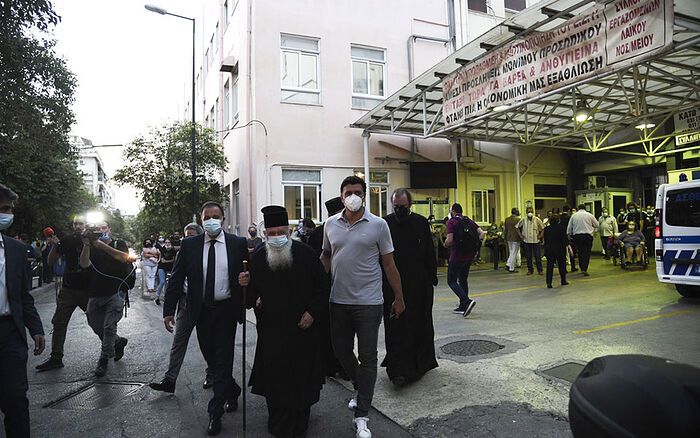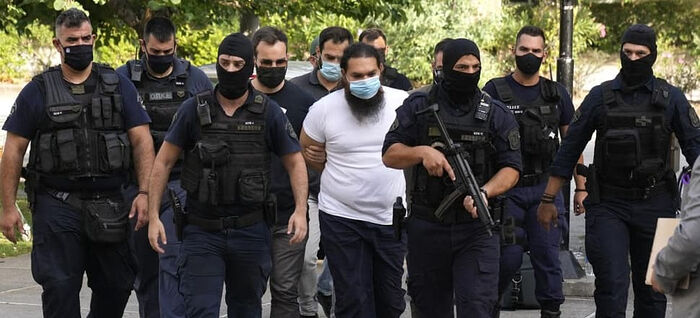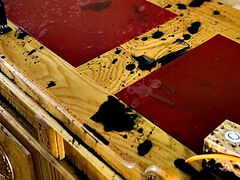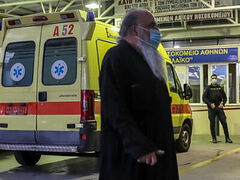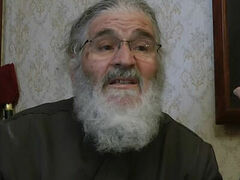Yesterday, a priest from the Metropolis of Veroia on trial before the Synodal Court of the Church of Greece for the crime of drug trafficking threw vitriol—a chemical acid—at seven Metropolitans. These seven Metropolitans were: the Metropolitan of Zakinthos Dionysius, the Metropolitan of Kassandria Nikodimos, the Metropolitan of Glyfada Antonios, the Metropolitan of Konitsa Andreas, the Metropolitan of Igoumenissa Dimitrios, the Metropolitan of Arta Kallinikos, and the Metropolitan of Kifissia Kirillos. These Bishops are now hospitalized, and three are in serious condition. This marks what is in effect the most serious attack—unprecedented—on Greek Orthodox clerics in recent memory. Despite our differences with the Greek Orthodox Church, it is our Christian duty to pray for our brethren. Violence to anyone is absolutely condemnable, and is fundamentally opposed to our Christian-European-Hellenic values. This attack draws a red line through the Greek Orthodox Church. This attack iconifies in itself the unresolved issues and questions surrounding the clergy and their formation or lack thereof. This attack, like COVID-19, forces the Greek Church to face these serious questions and to find solutions and answers to them. And we should support them in this soul-searching endeavor. There is also a reverberation from the State, or at least from certain factions of the government, in the immediate aftermath of the attack. One question seems to prevail over the rest: How did the Greek Orthodox Church come to the point where a thirty-seven- year-old priest throws sulfuric acid in the faces of seven Metropolitan bishops and two priests gathered in one room?
This is not the first time that scandal or sorrow has rocked the Greek Orthodox Church. The scandal with the Patriarchate of Jerusalem and the disposition of Patriarch Eirineus in the 2000’s, and the involvement of Archimandrite Iakovos Yossakis, whose name was known within the Greek justice system due to his involvement with criminal underground organizations—these events are well known and publicly documented, as are the events surrounding the splitting and dissolution of the Metropolis of Attica. Metropolitan Panteleimon of Attica was involved in embezzling money—millions of euros, which he used to build a mansion—from the renowned Monastery of St. Ephraim in Nea Makri. Tapes were released of conversations between Metropolitan Panteleimon and his gay lover. This scandal rocked Greece and the public’s trust in the Greek Orthodox Church hit an all time low.1 This trust was finally shattered with the death of Archbishop Christodoulos, perhaps the last hierarch whom Greek public opinion held in esteem.
Generally, the requirements for ordination were of a high moral and spiritual standard. To this day, there remains no mandatory seminary training for ordination in the Church of Greece. Theological studies are an asset but they are undertaken in a secular university environment. Again, the Church does not directly run any seminaries as do the other Orthodox Patriarchates or Autocephalous Churches.
And this highlights a question which has been frequently asked by stakeholders in the Greek government and the media within the past hours: One priest attacks seven metropolitans with acid because he is on trial for drug trafficking. So how did we get to this point? Where is the vetting process, where is the battery of psychological tests as they are undertaken prior to ordination in the West, in the Catholic Church? Where are the standards by which the Church hierarchy judges a layman’s competency for holy orders? And, since the government provides the clerical salaries, should the government play a role in any future process leading to ordination? Or (they imply), since the Church of Greece is a totally untrustworthy organization—the fact that it allowed such an attack at its own Synodal headquarters, at the very central administration of the Church of Greece—proves that the Church of Greece is an institution in chaos. And does this necessitate a complete Church-State divorce? These sentiments I have succinctly described are all being thrown about throughout the Greek media.
I will begin to provide answers to some of these. My answers are given out of a sincere love for the Church of Greece, and particularly the Metropolis of Hydra in which jurisdiction I received holy orders. The first question asked tonight in the media: Where is the vetting process, where is the battery of psychological tests as they are undertaken prior to ordination in the West, in the Catholic Church? Where are the standards by which the hierarchy judges a layman’s competency for holy orders? And, since the government provides the clerical salaries, should the government have a role in any future process that leads to ordination? The direct answer is: There is no vetting process. The vetting process, if it could be described as such, depends on the local Metropolitan and is based on what I would call, ancient Byzantine norms. That is, how well does the Metropolitan know the candidate and can the local clergy vouch for him? Most importantly, does his spiritual father vouch for him? And what is his family standing in society? This is not a question about whether his wife is well respected and his children behave honorably, though it does touch these issues. This is a question of how does his extended family behave and how do they stand in society’s eyes? This question is most pivotal in rural Greece and on the islands, where society is small and everyone is interconnected and even interrelated.
Three months prior to my ordination to the deaconate, I was a person unknown to the Metropolis of Hydra. One archimandrite from this jurisdiction approached me and expressed the idea that he and the diocese, while not knowing me personally, thought I was a good candidate for the priesthood. How could they ascertain who or what I am, in a responsible fashion? Many would vouch that ultimately, they judged correctly. I myself take a more philosophical view of the circumstances of my own ordination. Whether it was a correct decision or an incorrect decision we will find this out only when I die. Why is this so? The ancient Greeks said, We bless the end of man. That means, a man’s life is judged after his death.
Nonetheless, I—and countless others—received no training of a pastoral or an administrative nature. When I was newly ordained and newly assigned to my position at the parish in Fournoi, Kranidi I was inexperienced in many areas: in serving the Liturgy, in administering the sacraments, in pastoral situations, i.e., knowing how to deal with problems parishioners face—I also was inexperienced in parish administration and finances. And there is nothing wrong with being inexperienced. Yet I faced a diocesan administration and a chancellery who assumed that I should figure out this minefield on my own. And when too many mines exploded they conveniently pressured me to go.
This narrative is all-too-common amidst the Church of Greece. The hierarchy persecutes and exiles inexperienced priests or priests who perhaps are not “socially acceptable”; i.e., they are deemed too anti-government concerning the COVID-19 policies or they celebrate Pascha at midnight and therefore, “contravene the directives of the Holy Synod”. And yet, none of these clerics would dare conceive in their mind to throw sulfuric acid on seven Metropolitans. On the contrary, it is the clerics (specifically archimandrites)—young, of dubious moral character, like Fr.
Theophylaktos Komvos who brought two liters of sulfuric acid that he had decided to spray on seven metropolitans of the Church of Greece in the synodal courtroom during his trial—who are pampered by the diocesan hierarchy. Metropolitan Dionysius of Zakinthos said of the attack: “I saw my riassa and cassock melting off me.” And this is why we have arrived at such a terrible destination: Among the archimandrites of the Church of Greece, there is a large influx of mentally unstable celibate men of dubious moral character who seek a cassock under which they may “hide” their immoral lifestyle. And today, it has culminated in what is clearly an act of terrorism.
Now, what is to be done to correct this horrid situation? Already the media and state mouthpieces have disclosed that a vetting process is necessary, given that the clerical salaries are paid from the national coffers. Indeed, this very sentiment was expressed by a rather shocked Archbishop Ieronymos. I, personally, have serious reservations about any government body involving itself in ecclesial matters. Yet this does not preclude the Hellenic State from demanding that the Church require all archimandrites under forty and all future clergy undergo mandatory psychological evaluations as their counterparts do in the West. Nor does it preclude the State from demanding that the Church require a rigorous seminary education as is the standard practice in other Orthodox nations. The Greek Church must face the following reality: As long as the State pays, the State is within its right to make such demands. The State, in other words, is within its rights to demand that a vetting process exist—though for reasons of a moral nature, it should never involve itself in the vetting process.
Will any sort of meaningful relationship between Church and State bring forth trust amongst the common citizens and faithful? As long as the Church attempts to curry favor with the State, especially concerning COVID-19, no—it will remain an institution viewed by the public with contempt. As long as the Church of Greece sends requests to other Orthodox Churches (Cyprus) to “mop up” their bishops (Metropolitan of Morphou) who critique the Church of Greece’s COVID and Ukrainian policies (the Synod’s acknowledgment of the Ukrainian schismatic as the head of a Church, and its pro-OCU stance), while some ten days after said censorship requests were sent, they themselves—the Holy Synod of the Church of Greece—has seven Metropolitans in the hospital, three of whom are in ICU, because a priest sprayed them with sulfuric acid—this means one thing: They are a house in chaos, a house burning down. They, the Greek Church—have all the signs about them that they are a spiritually decaying, dying Church, a Church in its death throws like a falling star.
The Lord said: First take the beam out of your own eye and then remove it from your brother’s eye. And today these words of the Savior reverberate as if they were spoken this morning. Instead of looking outward for threats and aggressors, it is time for the hierarchy of the Church of Greece to look inward, in a spirit of repentance, with contrite hearts—so that real reform can be achieved for the greater glory of God and the inner stability of the Autocephalous Church of Greece.

